
Awesome_Multimodel_LLM
Awesome_Multimodel is a curated GitHub repository that provides a comprehensive collection of resources for Multimodal Large Language Models (MLLM). It covers datasets, tuning techniques, in-context learning, visual reasoning, foundational models, and more. Stay updated with the latest advancement.
Stars: 231
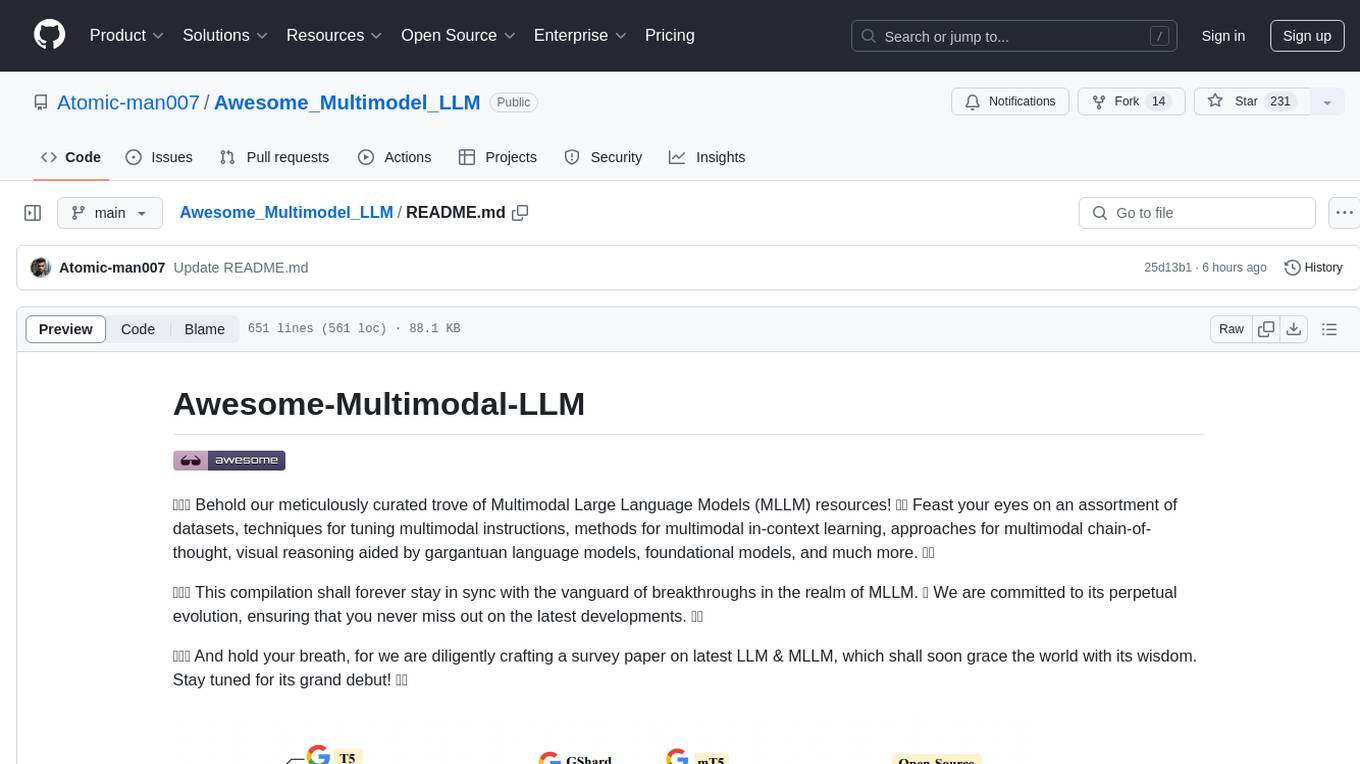
README:
✨✨✨ Behold our meticulously curated trove of Multimodal Large Language Models (MLLM) resources! 📚🔍 Feast your eyes on an assortment of datasets, techniques for tuning multimodal instructions, methods for multimodal in-context learning, approaches for multimodal chain-of-thought, visual reasoning aided by gargantuan language models, foundational models, and much more. 🌟🔥
✨✨✨ This compilation shall forever stay in sync with the vanguard of breakthroughs in the realm of MLLM. 🔄 We are committed to its perpetual evolution, ensuring that you never miss out on the latest developments. 🚀💡
✨✨✨ And hold your breath, for we are diligently crafting a survey paper on latest LLM & MLLM, which shall soon grace the world with its wisdom. Stay tuned for its grand debut! 🎉📑
Table of Contents- llm-course - Course to get into Large Language Models (LLMs) with roadmaps and Colab notebooks.
- Mixtral 8x7B - a high-quality sparse mixture of experts model (SMoE) with open weights.
- promptbase - All things prompt engineering.
- ollama - Get up and running with Llama 2 and other large language models locally.
- Devika Devin alternate SDE LLM
- anything-llm - A private ChatGPT to chat with anything!
- phi-2 - a 2.7 billion-parameter language model that demonstrates outstanding reasoning and language understanding capabilities, showcasing state-of-the-art performance among base language models with less than 13 billion parameters.
- [2023/10] Towards End-to-End Embodied Decision Making via Multi-modal Large Language Model: Explorations with GPT4-Vision and Beyond Liang Chen et al. arXiv. [paper] [code]
- This work proposes PCA-EVAL, which benchmarks embodied decision making via MLLM-based End-to-End method and LLM-based Tool-Using methods from Perception, Cognition and Action Levels.
- [2023/08] A Multitask, Multilingual, Multimodal Evaluation of ChatGPT on Reasoning, Hallucination, and Interactivity. Yejin Bang et al. arXiv. [paper]
- This work evaluates the multitask, multilingual and multimodal aspects of ChatGPT using 21 data sets covering 8 different common NLP application tasks.
- [2023/06] LLM-Eval: Unified Multi-Dimensional Automatic Evaluation for Open-Domain Conversations with Large Language Models. Yen-Ting Lin et al. arXiv. [paper]
- The LLM-EVAL method evaluates multiple dimensions of evaluation, such as content, grammar, relevance, and appropriateness.
- [2023/04] Is ChatGPT a Highly Fluent Grammatical Error Correction System? A Comprehensive Evaluation. Tao Fang et al. arXiv. [paper]
- The results of evaluation demonstrate that ChatGPT has excellent error detection capabilities and can freely correct errors to make the corrected sentences very fluent. Additionally, its performance in non-English and low-resource settings highlights its potential in multilingual GEC tasks.
- [2023/06] Clever Hans or Neural Theory of Mind? Stress Testing Social Reasoning in Large Language Models. Natalie Shapira et al. arXiv. [paper]
- LLMs exhibit certain theory of mind abilities, but this behavior is far from being robust.
- [2022/08] Inferring Rewards from Language in Context. Jessy Lin et al. ACL. [paper]
- This work presents a model that infers rewards from language and predicts optimal actions in unseen environment.
- [2021/10] Theory of Mind Based Assistive Communication in Complex Human Robot Cooperation. Moritz C. Buehler et al. arXiv. [paper]
- This work designs an agent Sushi with an understanding of the human during interaction.
- [2023/10] MemGPT: Towards LLMs as Operating Systems. Charles Packer (UC Berkeley) et al. arXiv. [paper] [project page] [code] [dataset]
- [2023/05] Randomized Positional Encodings Boost Length Generalization of Transformers. Anian Ruoss (DeepMind) et al. arXiv. [paper] [code]
- [2023-03] CoLT5: Faster Long-Range Transformers with Conditional Computation. Joshua Ainslie (Google Research) et al. arXiv. [paper]
- [2022/03] Efficient Classification of Long Documents Using Transformers. Hyunji Hayley Park (Illinois University) et al. arXiv. [paper] [code]
- [2021/12] LongT5: Efficient Text-To-Text Transformer for Long Sequences. Mandy Guo (Google Research) et al. arXiv. [paper] [code]
- [2019/10] BART: Denoising Sequence-to-Sequence Pre-training for Natural Language Generation, Translation, and Comprehension. Michael Lewis (Facebook AI) et al. arXiv. [paper] [code]
- [2023/10] Walking Down the Memory Maze: Beyond Context Limit through Interactive Reading Howard Chen (Princeton University) et al. arXiv. [paper]
- [2023/09] Empowering Private Tutoring by Chaining Large Language Models Yulin Chen (Tsinghua University) et al. arXiv. [paper]
- [2023/08] ExpeL: LLM Agents Are Experiential Learners. Andrew Zhao (Tsinghua University) et al. arXiv. [paper] [code]
- [2023/08] ChatEval: Towards Better LLM-based Evaluators through Multi-Agent Debate. Chi-Min Chan (Tsinghua University) et al. arXiv. [paper] [code]
- [2023/05] MemoryBank: Enhancing Large Language Models with Long-Term Memory. Wanjun Zhong (Harbin Institute of Technology) et al. arXiv. [paper] [code]
- [2023/04] Generative Agents: Interactive Simulacra of Human Behavior. Joon Sung Park (Stanford University) et al. arXiv. [paper] [code]
- [2023/04] Unleashing Infinite-Length Input Capacity for Large-scale Language Models with Self-Controlled Memory System. Xinnian Liang (Beihang University) et al. arXiv. [paper] [code]
- [2023/03] Reflexion: Language Agents with Verbal Reinforcement Learning. Noah Shinn (Northeastern University) et al. arXiv. [paper] [code]
- [2023/05] RecurrentGPT: Interactive Generation of (Arbitrarily) Long Text. Wangchunshu Zhou (AIWaves) et al. arXiv. [paper] [code]
- [2023/07] Communicative Agents for Software Development. Chen Qian (Tsinghua University) et al. arXiv. [paper] [code]
- [2023/06] ChatDB: Augmenting LLMs with Databases as Their Symbolic Memory. Chenxu Hu (Tsinghua University) et al. arXiv. [paper] [code]
- [2023/05] Ghost in the Minecraft: Generally Capable Agents for Open-World Environments via Large Language Models with Text-based Knowledge and Memory. Xizhou Zhu (Tsinghua University) et al. arXiv. [paper] [code]
- [2023/05] RET-LLM: Towards a General Read-Write Memory for Large Language Models. Ali Modarressi (LMU Munich) et al. arXiv. [paper] [code]
- [2023/05] RecurrentGPT: Interactive Generation of (Arbitrarily) Long Text. Wangchunshu Zhou (AIWaves) et al. arXiv. [paper] [code]
- [2023/08] Memory Sandbox: Transparent and Interactive Memory Management for Conversational Agents. Ziheng Huang (University of California—San Diego) et al. arXiv. [paper]
- [2023/08] AgentSims: An Open-Source Sandbox for Large Language Model Evaluation. Jiaju Lin (PTA Studio) et al. arXiv. [paper] [project page] [code]
- [2023/06] ChatDB: Augmenting LLMs with Databases as Their Symbolic Memory. Chenxu Hu (Tsinghua University) et al. arXiv. [paper] [code]
- [2023/05] MemoryBank: Enhancing Large Language Models with Long-Term Memory. Wanjun Zhong (Harbin Institute of Technology) et al. arXiv. [paper] [code]
- [2023/04] Generative Agents: Interactive Simulacra of Human Behavior. Joon Sung Park (Stanford) et al. arXiv. [paper] [code]
- [2023/05] RecurrentGPT: Interactive Generation of (Arbitrarily) Long Text. Wangchunshu Zhou (AIWaves) et al. arXiv. [paper] [code]
| Title | Venue | Date | Code | Demo |
|---|---|---|---|---|
 MIMIC-IT: Multi-Modal In-Context Instruction Tuning |
arXiv | 2023-06-08 | Github | Demo |
 Chameleon: Plug-and-Play Compositional Reasoning with Large Language Models |
arXiv | 2023-04-19 | Github | Demo |
 HuggingGPT: Solving AI Tasks with ChatGPT and its Friends in HuggingFace |
arXiv | 2023-03-30 | Github | Demo |
 MM-REACT: Prompting ChatGPT for Multimodal Reasoning and Action |
arXiv | 2023-03-20 | Github | Demo |
 Prompting Large Language Models with Answer Heuristics for Knowledge-based Visual Question Answering |
CVPR | 2023-03-03 | Github | - |
 Visual Programming: Compositional visual reasoning without training |
CVPR | 2022-11-18 | Github | Local Demo |
 An Empirical Study of GPT-3 for Few-Shot Knowledge-Based VQA |
AAAI | 2022-06-28 | Github | - |
 Flamingo: a Visual Language Model for Few-Shot Learning |
NeurIPS | 2022-04-29 | Github | Demo |
| Multimodal Few-Shot Learning with Frozen Language Models | NeurIPS | 2021-06-25 | - | - |
| Title | Venue | Date | Code | Demo |
|---|---|---|---|---|
 Transfer Visual Prompt Generator across LLMs |
arXiv | 2023-05-02 | Github | Demo |
| GPT-4 Technical Report | arXiv | 2023-03-15 | - | - |
| PaLM-E: An Embodied Multimodal Language Model | arXiv | 2023-03-06 | - | Demo |
 Prismer: A Vision-Language Model with An Ensemble of Experts |
arXiv | 2023-03-04 | Github | Demo |
 Language Is Not All You Need: Aligning Perception with Language Models |
arXiv | 2023-02-27 | Github | - |
 BLIP-2: Bootstrapping Language-Image Pre-training with Frozen Image Encoders and Large Language Models |
arXiv | 2023-01-30 | Github | Demo |
 VIMA: General Robot Manipulation with Multimodal Prompts |
ICML | 2022-10-06 | Github | Local Demo |
 MineDojo: Building Open-Ended Embodied Agents with Internet-Scale Knowledge |
NeurIPS | 2022-06-17 | Github | - |
| Title | Venue | Date | Code | Demo |
|---|---|---|---|---|
 Charting New Territories: Exploring the Geographic and Geospatial Capabilities of Multimodal LLMs |
arXiv | 2023-11-24 | Github | - |
| Can Large Pre-trained Models Help Vision Models on Perception Tasks? | arXiv | 2023-06-01 | Coming soon | - |
 Contextual Object Detection with Multimodal Large Language Models |
arXiv | 2023-05-29 | Github | Demo |
 Generating Images with Multimodal Language Models |
arXiv | 2023-05-26 | Github | - |
 On Evaluating Adversarial Robustness of Large Vision-Language Models |
arXiv | 2023-05-26 | Github | - |
 Evaluating Object Hallucination in Large Vision-Language Models |
arXiv | 2023-05-17 | Github | - |
 Grounding Language Models to Images for Multimodal Inputs and Outputs |
ICML | 2023-01-31 | Github | Demo |
- [Andrej Karpathy] State of GPT video
- [Hyung Won Chung] Instruction finetuning and RLHF lecture Youtube
- [Jason Wei] Scaling, emergence, and reasoning in large language models Slides
- [Susan Zhang] Open Pretrained Transformers Youtube
- [Ameet Deshpande] How Does ChatGPT Work? Slides
- [Yao Fu] 预训练,指令微调,对齐,专业化:论大语言模型能力的来源 Bilibili
- [Hung-yi Lee] ChatGPT 原理剖析 Youtube
- [Jay Mody] GPT in 60 Lines of NumPy Link
- [ICML 2022] Welcome to the "Big Model" Era: Techniques and Systems to Train and Serve Bigger Models Link
- [NeurIPS 2022] Foundational Robustness of Foundation Models Link
- [Andrej Karpathy] Let's build GPT: from scratch, in code, spelled out. Video|Code
- [DAIR.AI] Prompt Engineering Guide Link
- [邱锡鹏] 大型语言模型的能力分析与应用 Slides | Video
- [Philipp Schmid] Fine-tune FLAN-T5 XL/XXL using DeepSpeed & Hugging Face Transformers Link
- [HuggingFace] Illustrating Reinforcement Learning from Human Feedback (RLHF) Link
- [HuggingFace] What Makes a Dialog Agent Useful? Link
- [张俊林]通向AGI之路:大型语言模型(LLM)技术精要 Link
- [大师兄]ChatGPT/InstructGPT详解 Link
- [HeptaAI]ChatGPT内核:InstructGPT,基于反馈指令的PPO强化学习 Link
- [Yao Fu] How does GPT Obtain its Ability? Tracing Emergent Abilities of Language Models to their Sources Link
- [Stephen Wolfram] What Is ChatGPT Doing … and Why Does It Work? Link
- [Jingfeng Yang] Why did all of the public reproduction of GPT-3 fail? Link
- [Hung-yi Lee] ChatGPT (可能)是怎麼煉成的 - GPT 社會化的過程 Video
- [Keyvan Kambakhsh] Pure Rust implementation of a minimal Generative Pretrained Transformer code
- LLaMA2 - A revolutionary version of llama , 70 - 13 - 7 -billion-parameter large language model. LLaMA2 HF - TheBloke/Llama-2-13B-GPTQ
-
LLaMA - A foundational, 65-billion-parameter large language model. LLaMA.cpp Lit-LLaMA
- Alpaca - A model fine-tuned from the LLaMA 7B model on 52K instruction-following demonstrations. Alpaca.cpp Alpaca-LoRA
- Flan-Alpaca - Instruction Tuning from Humans and Machines.
- Baize - Baize is an open-source chat model trained with LoRA. It uses 100k dialogs generated by letting ChatGPT chat with itself.
- Cabrita - A portuguese finetuned instruction LLaMA.
- Vicuna - An Open-Source Chatbot Impressing GPT-4 with 90% ChatGPT Quality.
- Vicuna - An Open-Source Chatbot Impressing GPT-4 with 90% ChatGPT Quality.
- Llama-X - Open Academic Research on Improving LLaMA to SOTA LLM.
- Chinese-Vicuna - A Chinese Instruction-following LLaMA-based Model.
- GPTQ-for-LLaMA - 4 bits quantization of LLaMA using GPTQ.
- GPT4All - Demo, data, and code to train open-source assistant-style large language model based on GPT-J and LLaMa.
- Koala - A Dialogue Model for Academic Research
- BELLE - Be Everyone's Large Language model Engine
- StackLLaMA - A hands-on guide to train LLaMA with RLHF.
- RedPajama - An Open Source Recipe to Reproduce LLaMA training dataset.
- Chimera - Latin Phoenix.
- WizardLM|WizardCoder - Family of instruction-following LLMs powered by Evol-Instruct: WizardLM, WizardCoder.
- CaMA - a Chinese-English Bilingual LLaMA Model.
- Orca - Microsoft's finetuned LLaMA model that reportedly matches GPT3.5, finetuned against 5M of data, ChatGPT, and GPT4
- BayLing - an English/Chinese LLM equipped with advanced language alignment, showing superior capability in English/Chinese generation, instruction following and multi-turn interaction.
- UltraLM - Large-scale, Informative, and Diverse Multi-round Chat Models.
- Guanaco - QLoRA tuned LLaMA
-
BLOOM - BigScience Large Open-science Open-access Multilingual Language Model BLOOM-LoRA
- BLOOMZ&mT0 - a family of models capable of following human instructions in dozens of languages zero-shot.
- Phoenix
-
T5 - Text-to-Text Transfer Transformer
- T0 - Multitask Prompted Training Enables Zero-Shot Task Generalization
- OPT - Open Pre-trained Transformer Language Models.
- UL2 - a unified framework for pretraining models that are universally effective across datasets and setups.
-
GLM- GLM is a General Language Model pretrained with an autoregressive blank-filling objective and can be finetuned on various natural language understanding and generation tasks.
- ChatGLM-6B - ChatGLM-6B 是一个开源的、支持中英双语的对话语言模型,基于 General Language Model (GLM) 架构,具有 62 亿参数.
- ChatGLM2-6B - An Open Bilingual Chat LLM | 开源双语对话语言模型
-
RWKV - Parallelizable RNN with Transformer-level LLM Performance.
- ChatRWKV - ChatRWKV is like ChatGPT but powered by my RWKV (100% RNN) language model.
- StableLM - Stability AI Language Models.
- YaLM - a GPT-like neural network for generating and processing text. It can be used freely by developers and researchers from all over the world.
- GPT-Neo - An implementation of model & data parallel GPT3-like models using the mesh-tensorflow library.
-
GPT-J - A 6 billion parameter, autoregressive text generation model trained on The Pile.
- Dolly - a cheap-to-build LLM that exhibits a surprising degree of the instruction following capabilities exhibited by ChatGPT.
- Pythia - Interpreting Autoregressive Transformers Across Time and Scale
- Dolly 2.0 - the first open source, instruction-following LLM, fine-tuned on a human-generated instruction dataset licensed for research and commercial use.
- OpenFlamingo - an open-source reproduction of DeepMind's Flamingo model.
- Cerebras-GPT - A Family of Open, Compute-efficient, Large Language Models.
-
GALACTICA - The GALACTICA models are trained on a large-scale scientific corpus.
- GALPACA - GALACTICA 30B fine-tuned on the Alpaca dataset.
- Palmyra - Palmyra Base was primarily pre-trained with English text.
- Camel - a state-of-the-art instruction-following large language model designed to deliver exceptional performance and versatility.
- h2oGPT
- PanGu-α - PanGu-α is a 200B parameter autoregressive pretrained Chinese language model develped by Huawei Noah's Ark Lab, MindSpore Team and Peng Cheng Laboratory.
- MOSS - MOSS是一个支持中英双语和多种插件的开源对话语言模型.
-
Open-Assistant - a project meant to give everyone access to a great chat based large language model.
- HuggingChat - Powered by Open Assistant's latest model – the best open source chat model right now and @huggingface Inference API.
- StarCoder - Hugging Face LLM for Code
- MPT-7B - Open LLM for commercial use by MosaicML
- Falcon - Falcon LLM is a foundational large language model (LLM) with 40 billion parameters trained on one trillion tokens. TII has now released Falcon LLM – a 40B model.
- XGen - Salesforce open-source LLMs with 8k sequence length.
- baichuan-7B - baichuan-7B 是由百川智能开发的一个开源可商用的大规模预训练语言模型.
- Aquila - 悟道·天鹰语言大模型是首个具备中英双语知识、支持商用许可协议、国内数据合规需求的开源语言大模型。
- DeepSpeed - DeepSpeed is a deep learning optimization library that makes distributed training and inference easy, efficient, and effective.
- Megatron-DeepSpeed - DeepSpeed version of NVIDIA's Megatron-LM that adds additional support for several features such as MoE model training, Curriculum Learning, 3D Parallelism, and others.
- FairScale - FairScale is a PyTorch extension library for high performance and large scale training.
- Megatron-LM - Ongoing research training transformer models at scale.
- Colossal-AI - Making large AI models cheaper, faster, and more accessible.
- BMTrain - Efficient Training for Big Models.
- Mesh Tensorflow - Mesh TensorFlow: Model Parallelism Made Easier.
- maxtext - A simple, performant and scalable Jax LLM!
- Alpa - Alpa is a system for training and serving large-scale neural networks.
- GPT-NeoX - An implementation of model parallel autoregressive transformers on GPUs, based on the DeepSpeed library.
- FastChat - A distributed multi-model LLM serving system with web UI and OpenAI-compatible RESTful APIs.
- SkyPilot - Run LLMs and batch jobs on any cloud. Get maximum cost savings, highest GPU availability, and managed execution -- all with a simple interface.
- vLLM - A high-throughput and memory-efficient inference and serving engine for LLMs
- Text Generation Inference - A Rust, Python and gRPC server for text generation inference. Used in production at HuggingFace to power LLMs api-inference widgets.
- Haystack - an open-source NLP framework that allows you to use LLMs and transformer-based models from Hugging Face, OpenAI and Cohere to interact with your own data.
- Sidekick - Data integration platform for LLMs.
- LangChain - Building applications with LLMs through composability
- wechat-chatgpt - Use ChatGPT On Wechat via wechaty
- promptfoo - Test your prompts. Evaluate and compare LLM outputs, catch regressions, and improve prompt quality.
- Agenta - Easily build, version, evaluate and deploy your LLM-powered apps.
- Embedchain - Framework to create ChatGPT like bots over your dataset.
- [DeepLearning.AI] ChatGPT Prompt Engineering for Developers Homepage
- [Princeton] Understanding Large Language Models Homepage
- [OpenBMB] 大模型公开课 主页
- [Stanford] CS224N-Lecture 11: Prompting, Instruction Finetuning, and RLHF Slides
- [Stanford] CS324-Large Language Models Homepage
- [Stanford] CS25-Transformers United V2 Homepage
- [Stanford Webinar] GPT-3 & Beyond Video
- [李沐] InstructGPT论文精读 Bilibili Youtube
- [陳縕儂] OpenAI InstructGPT 從人類回饋中學習 ChatGPT 的前身 Youtube
- [李沐] HELM全面语言模型评测 Bilibili
- [李沐] GPT,GPT-2,GPT-3 论文精读 Bilibili Youtube
- [Aston Zhang] Chain of Thought论文 Bilibili Youtube
- [MIT] Introduction to Data-Centric AI Homepage
- Mistral - Mistral-7B-v0.1 is a small, yet powerful model adaptable to many use-cases including code and 8k sequence length. Apache 2.0 licence.
- Mixtral 8x7B - a high-quality sparse mixture of experts model (SMoE) with open weights.
- AutoGPT - an experimental open-source application showcasing the capabilities of the GPT-4 language model.
- OpenAGI - When LLM Meets Domain Experts.
- HuggingGPT - Solving AI Tasks with ChatGPT and its Friends in HuggingFace.
- EasyEdit - An easy-to-use framework to edit large language models.
- chatgpt-shroud - A Chrome extension for OpenAI's ChatGPT, enhancing user privacy by enabling easy hiding and unhiding of chat history. Ideal for privacy during screen shares.
- Arize-Phoenix - Open-source tool for ML observability that runs in your notebook environment. Monitor and fine tune LLM, CV and Tabular Models.
- Emergent Mind - The latest AI news, curated & explained by GPT-4.
- ShareGPT - Share your wildest ChatGPT conversations with one click.
- Major LLMs + Data Availability
- 500+ Best AI Tools
- Cohere Summarize Beta - Introducing Cohere Summarize Beta: A New Endpoint for Text Summarization
- chatgpt-wrapper - ChatGPT Wrapper is an open-source unofficial Python API and CLI that lets you interact with ChatGPT.
- Open-evals - A framework extend openai's Evals for different language model.
- Cursor - Write, edit, and chat about your code with a powerful AI.
- YiVal — Evaluate and Evolve: YiVal is an open-source GenAI-Ops tool for tuning and evaluating prompts, configurations, and model parameters using customizable datasets, evaluation methods, and improvement strategies.
- Guidance — A handy looking Python library from Microsoft that uses Handlebars templating to interleave generation, prompting, and logical control.
- LangChain — A popular Python/JavaScript library for chaining sequences of language model prompts.
- FLAML (A Fast Library for Automated Machine Learning & Tuning): A Python library for automating selection of models, hyperparameters, and other tunable choices.
- Chainlit — A Python library for making chatbot interfaces.
- Guardrails.ai — A Python library for validating outputs and retrying failures. Still in alpha, so expect sharp edges and bugs.
- Semantic Kernel — A Python/C#/Java library from Microsoft that supports prompt templating, function chaining, vectorized memory, and intelligent planning.
- Prompttools — Open-source Python tools for testing and evaluating models, vector DBs, and prompts.
- Outlines — A Python library that provides a domain-specific language to simplify prompting and constrain generation.
- Promptify — A small Python library for using language models to perform NLP tasks.
- Scale Spellbook — A paid product for building, comparing, and shipping language model apps.
- PromptPerfect — A paid product for testing and improving prompts.
- Weights & Biases — A paid product for tracking model training and prompt engineering experiments.
- OpenAI Evals — An open-source library for evaluating task performance of language models and prompts.
- LlamaIndex — A Python library for augmenting LLM apps with data.
- Arthur Shield — A paid product for detecting toxicity, hallucination, prompt injection, etc.
- LMQL — A programming language for LLM interaction with support for typed prompting, control flow, constraints, and tools.
- ModelFusion - A TypeScript library for building apps with LLMs and other ML models (speech-to-text, text-to-speech, image generation).
- Flappy — Production-Ready LLM Agent SDK for Every Developer.
- GPTRouter - GPTRouter is an open source LLM API Gateway that offers a universal API for 30+ LLMs, vision, and image models, with smart fallbacks based on uptime and latency, automatic retries, and streaming. Stay operational even when OpenAI is down
| Name | Paper | Link | Notes |
|---|---|---|---|
| MIMIC-IT | MIMIC-IT: Multi-Modal In-Context Instruction Tuning | Coming soon | Multimodal in-context instruction dataset |
| Name | Paper | Link | Notes |
|---|---|---|---|
| EgoCOT | EmbodiedGPT: Vision-Language Pre-Training via Embodied Chain of Thought | Coming soon | Large-scale embodied planning dataset |
| VIP | Let’s Think Frame by Frame: Evaluating Video Chain of Thought with Video Infilling and Prediction | Coming soon | An inference-time dataset that can be used to evaluate VideoCOT |
| ScienceQA | Learn to Explain: Multimodal Reasoning via Thought Chains for Science Question Answering | Link | Large-scale multi-choice dataset, featuring multimodal science questions and diverse domains |
- RedPajama, 2023. Repo
- The Pile: An 800GB Dataset of Diverse Text for Language Modeling, Arxiv 2020. Paper
- How does the pre-training objective affect what large language models learn about linguistic properties?, ACL 2022. Paper
- Scaling laws for neural language models, 2020. Paper
- Data-centric artificial intelligence: A survey, 2023. Paper
- How does GPT Obtain its Ability? Tracing Emergent Abilities of Language Models to their Sources, 2022. Blog
- Benchmarking zero-shot text classification: Datasets, evaluation and entailment approach, EMNLP 2019. Paper
- Language Models are Few-Shot Learners, NIPS 2020. Paper
- Does Synthetic Data Generation of LLMs Help Clinical Text Mining? Arxiv 2023 Paper
- Shortcut learning of large language models in natural language understanding: A survey, Arxiv 2023. Paper
- On the Robustness of ChatGPT: An Adversarial and Out-of-distribution Perspective Arxiv, 2023. Paper
- SuperGLUE: A Stickier Benchmark for General-Purpose Language Understanding Systems Arxiv 2019. Paper
We build a decision flow for choosing LLMs or fine-tuned models~\protect\footnotemark for user's NLP applications. The decision flow helps users assess whether their downstream NLP applications at hand meet specific conditions and, based on that evaluation, determine whether LLMs or fine-tuned models are the most suitable choice for their applications.
- A benchmark for toxic comment classification on civil comments dataset Arxiv 2023 Paper
- Is chatgpt a general-purpose natural language processing task solver? Arxiv 2023Paper
- Benchmarking large language models for news summarization Arxiv 2022 Paper
- News summarization and evaluation in the era of gpt-3 Arxiv 2022 Paper
- Is chatgpt a good translator? yes with gpt-4 as the engine Arxiv 2023 Paper
- Multilingual machine translation systems from Microsoft for WMT21 shared task, WMT2021 Paper
- Can ChatGPT understand too? a comparative study on chatgpt and fine-tuned bert, Arxiv 2023, Paper
- Measuring massive multitask language understanding, ICLR 2021 Paper
- Beyond the imitation game: Quantifying and extrapolating the capabilities of language models, Arxiv 2022 Paper
- Inverse scaling prize, 2022 Link
- Atlas: Few-shot Learning with Retrieval Augmented Language Models, Arxiv 2022 Paper
- Large Language Models Encode Clinical Knowledge, Arxiv 2022 Paper
- Training Compute-Optimal Large Language Models, NeurIPS 2022 Paper
- Scaling Laws for Neural Language Models, Arxiv 2020 Paper
- Solving math word problems with process- and outcome-based feedback, Arxiv 2022 Paper
- Chain of thought prompting elicits reasoning in large language models, NeurIPS 2022 Paper
- Emergent abilities of large language models, TMLR 2022 Paper
- Inverse scaling can become U-shaped, Arxiv 2022 Paper
- Towards Reasoning in Large Language Models: A Survey, Arxiv 2022 Paper
- Image as a Foreign Language: BEiT Pretraining for All Vision and Vision-Language Tasks, Arixv 2022 Paper
- PaLI: A Jointly-Scaled Multilingual Language-Image Model, Arxiv 2022 Paper
- AugGPT: Leveraging ChatGPT for Text Data Augmentation, Arxiv 2023 Paper
- Is gpt-3 a good data annotator?, Arxiv 2022 Paper
- Want To Reduce Labeling Cost? GPT-3 Can Help, EMNLP findings 2021 Paper
- GPT3Mix: Leveraging Large-scale Language Models for Text Augmentation, EMNLP findings 2021 Paper
- LLM for Patient-Trial Matching: Privacy-Aware Data Augmentation Towards Better Performance and Generalizability, Arxiv 2023 Paper
- ChatGPT Outperforms Crowd-Workers for Text-Annotation Tasks, Arxiv 2023 Paper
- G-Eval: NLG Evaluation using GPT-4 with Better Human Alignment, Arxiv 2023 Paper
- GPTScore: Evaluate as You Desire, Arxiv 2023 Paper
- Large Language Models Are State-of-the-Art Evaluators of Translation Quality, Arxiv 2023 Paper
- Is ChatGPT a Good NLG Evaluator? A Preliminary Study, Arxiv 2023 Paper
- GPT4GEO: How a Language Model Sees the World's Geography, NeurIPSW 2023 Paper, Code
- Sparks of Artificial General Intelligence: Early experiments with GPT-4, Arxiv 2023 Paper
- Cost
- Openai’s gpt-3 language model: A technical overview, 2020. Blog Post
- Measuring the carbon intensity of ai in cloud instances, FaccT 2022. Paper
- In AI, is bigger always better?, Nature Article 2023. Article
- Language Models are Few-Shot Learners, NeurIPS 2020. Paper
- Pricing, OpenAI. Blog Post
- Latency
- HELM: Holistic evaluation of language models, Arxiv 2022. Paper
- Parameter-Efficient Fine-Tuning
- LoRA: Low-Rank Adaptation of Large Language Models, Arxiv 2021. Paper
- Prefix-Tuning: Optimizing Continuous Prompts for Generation, ACL 2021. Paper
- P-Tuning: Prompt Tuning Can Be Comparable to Fine-tuning Across Scales and Tasks, ACL 2022. Paper
- P-Tuning v2: Prompt Tuning Can Be Comparable to Fine-tuning Universally Across Scales and Tasks, Arxiv 2022. Paper
- Pretraining System
- ZeRO: Memory Optimizations Toward Training Trillion Parameter Models, Arxiv 2019. Paper
- Megatron-LM: Training Multi-Billion Parameter Language Models Using Model Parallelism, Arxiv 2019. Paper
- Efficient Large-Scale Language Model Training on GPU Clusters Using Megatron-LM, Arxiv 2021. Paper
- Reducing Activation Recomputation in Large Transformer Models, Arxiv 2021. Paper
-
HH-RLHF
- Ben Mann, Deep Ganguli
- Keyword: Human preference dataset, Red teaming data, machine-written
- Task: Open-source dataset for human preference data about helpfulness and harmlessness
-
Stanford Human Preferences Dataset(SHP)
- Ethayarajh, Kawin and Zhang, Heidi and Wang, Yizhong and Jurafsky, Dan
- Keyword: Naturally occurring and human-written dataset,18 different subject areas
- Task: Intended to be used for training RLHF reward models
-
PromptSource
- Stephen H. Bach, Victor Sanh, Zheng-Xin Yong et al.
- Keyword: Prompted English datasets, Mapping a data example into natural language
- Task: Toolkit for creating, Sharing and using natural language prompts
-
Structured Knowledge Grounding(SKG) Resources Collections
- Tianbao Xie, Chen Henry Wu, Peng Shi et al.
- Keyword: Structured Knowledge Grounding
- Task: Collection of datasets are related to structured knowledge grounding
-
The Flan Collection
- Longpre Shayne, Hou Le, Vu Tu et al.
- Task: Collection compiles datasets from Flan 2021, P3, Super-Natural Instructions
-
rlhf-reward-datasets
- Yiting Xie
- Keyword: Machine-written dataset
-
webgpt_comparisons
- OpenAI
- Keyword: Human-written dataset, Long form question answering
- Task: Train a long form question answering model to align with human preferences
-
summarize_from_feedback
- OpenAI
- Keyword: Human-written dataset, summarization
- Task: Train a summarization model to align with human preferences
-
Dahoas/synthetic-instruct-gptj-pairwise
- Dahoas
- Keyword: Human-written dataset, synthetic dataset
-
Stable Alignment - Alignment Learning in Social Games
- Ruibo Liu, Ruixin (Ray) Yang, Qiang Peng
- Keyword: Interaction data used for alignment training, Run in Sandbox
- Task: Train on the recorded interaction data in simulated social games
-
LIMA
- Meta AI
- Keyword: without any RLHF, few carefully curated prompts and responses
- Task: Dataset used for training the LIMA model
- Shortcut learning of large language models in natural language understanding: A survey, Arxiv 2023. Paper
- On the Robustness of ChatGPT: An Adversarial and Out-of-distribution Perspective Arxiv, 2023. Paper
- SuperGLUE: A Stickier Benchmark for General-Purpose Language Understanding Systems Arxiv 2019. Paper
For Tasks:
Click tags to check more tools for each tasksFor Jobs:
Alternative AI tools for Awesome_Multimodel_LLM
Similar Open Source Tools
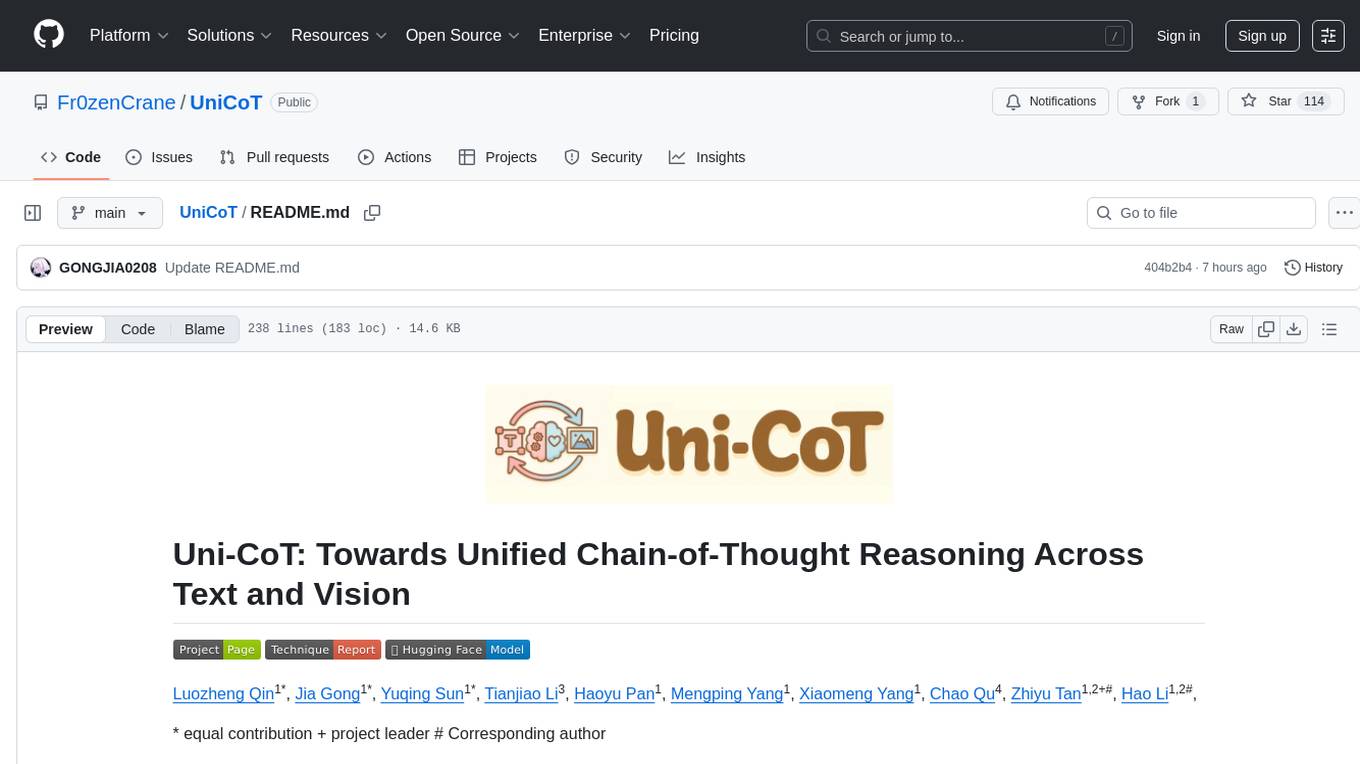
UniCoT
Uni-CoT is a unified reasoning framework that extends Chain-of-Thought (CoT) principles to the multimodal domain, enabling Multimodal Large Language Models (MLLMs) to perform interpretable, step-by-step reasoning across both text and vision. It decomposes complex multimodal tasks into structured, manageable steps that can be executed sequentially or in parallel, allowing for more scalable and systematic reasoning.
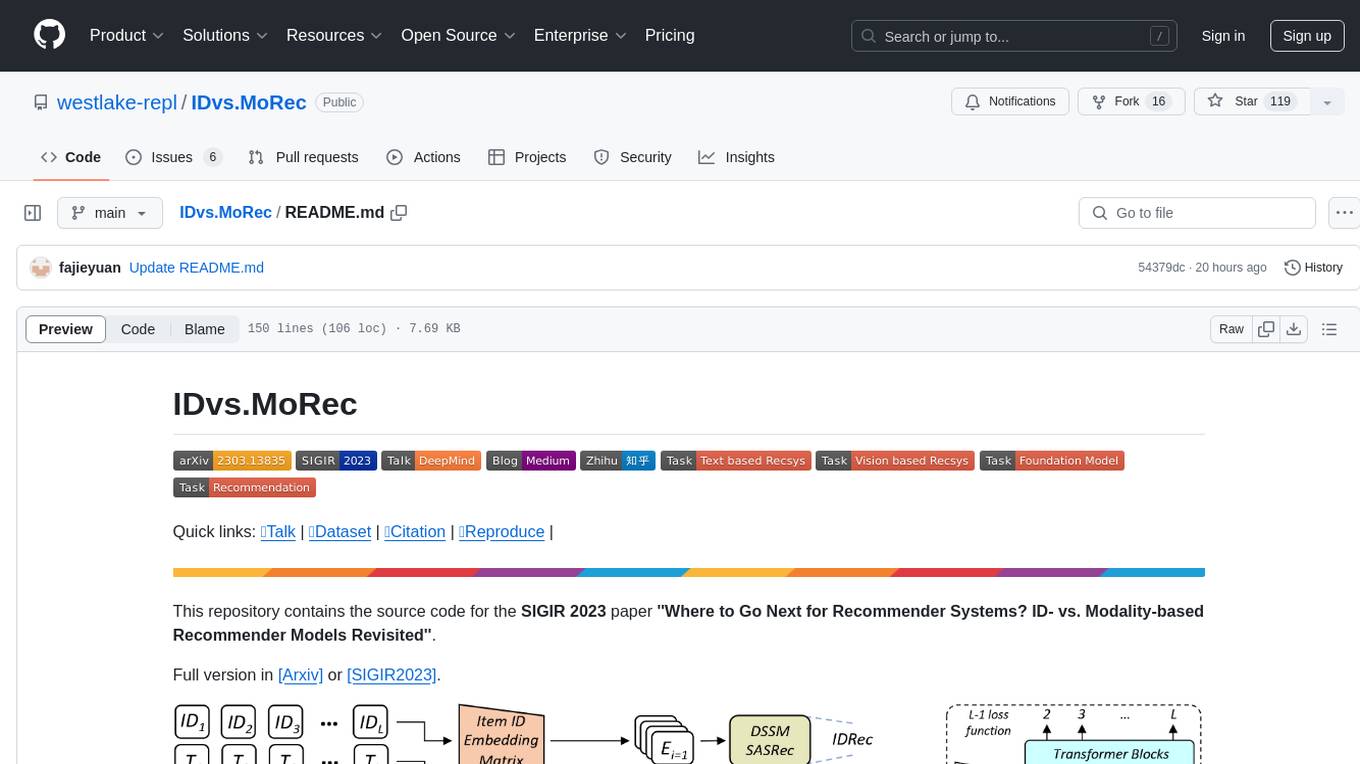
IDvs.MoRec
This repository contains the source code for the SIGIR 2023 paper 'Where to Go Next for Recommender Systems? ID- vs. Modality-based Recommender Models Revisited'. It provides resources for evaluating foundation, transferable, multi-modal, and LLM recommendation models, along with datasets, pre-trained models, and training strategies for IDRec and MoRec using in-batch debiased cross-entropy loss. The repository also offers large-scale datasets, code for SASRec with in-batch debias cross-entropy loss, and information on joining the lab for research opportunities.
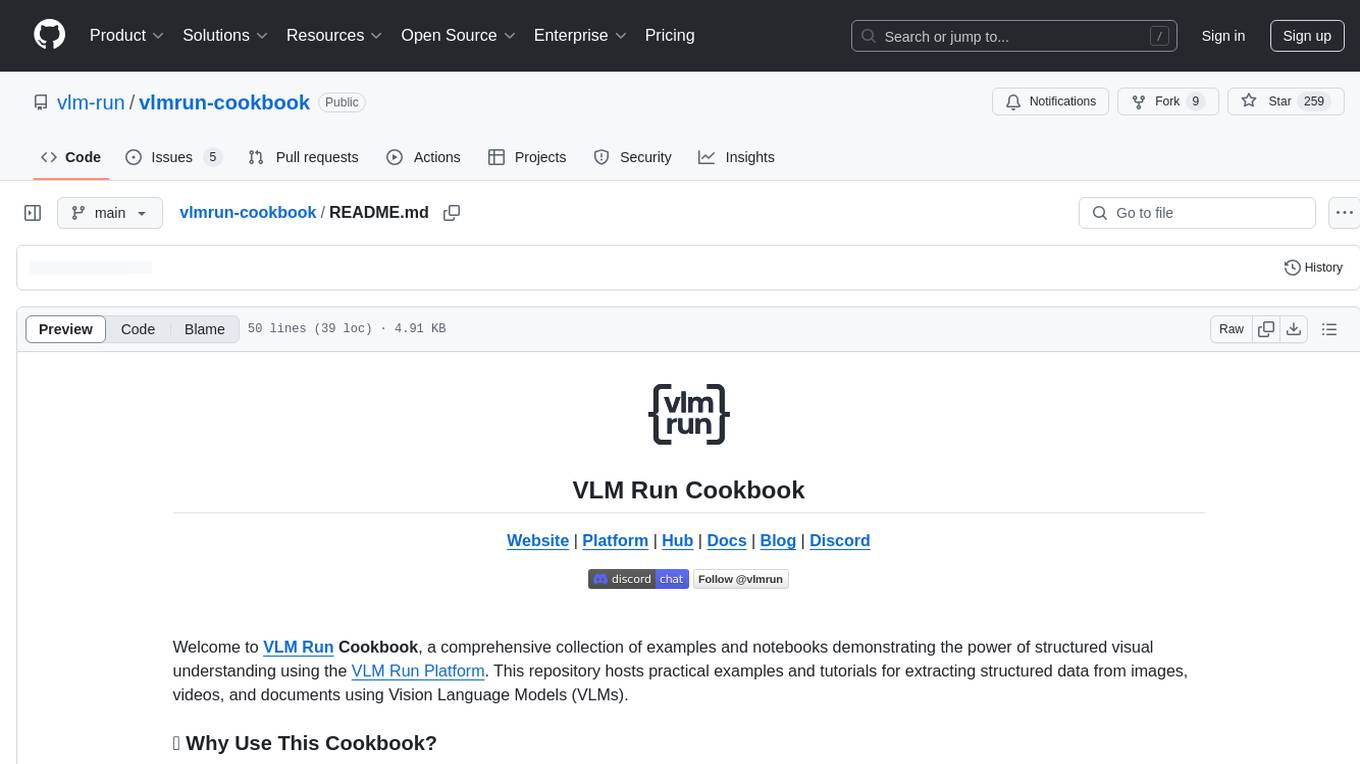
vlmrun-cookbook
VLM Run Cookbook is a repository containing practical examples and tutorials for extracting structured data from images, videos, and documents using Vision Language Models (VLMs). It offers comprehensive Colab notebooks demonstrating real-world applications of VLM Run, with complete code and documentation for easy adaptation. The examples cover various domains such as financial documents and TV news analysis.
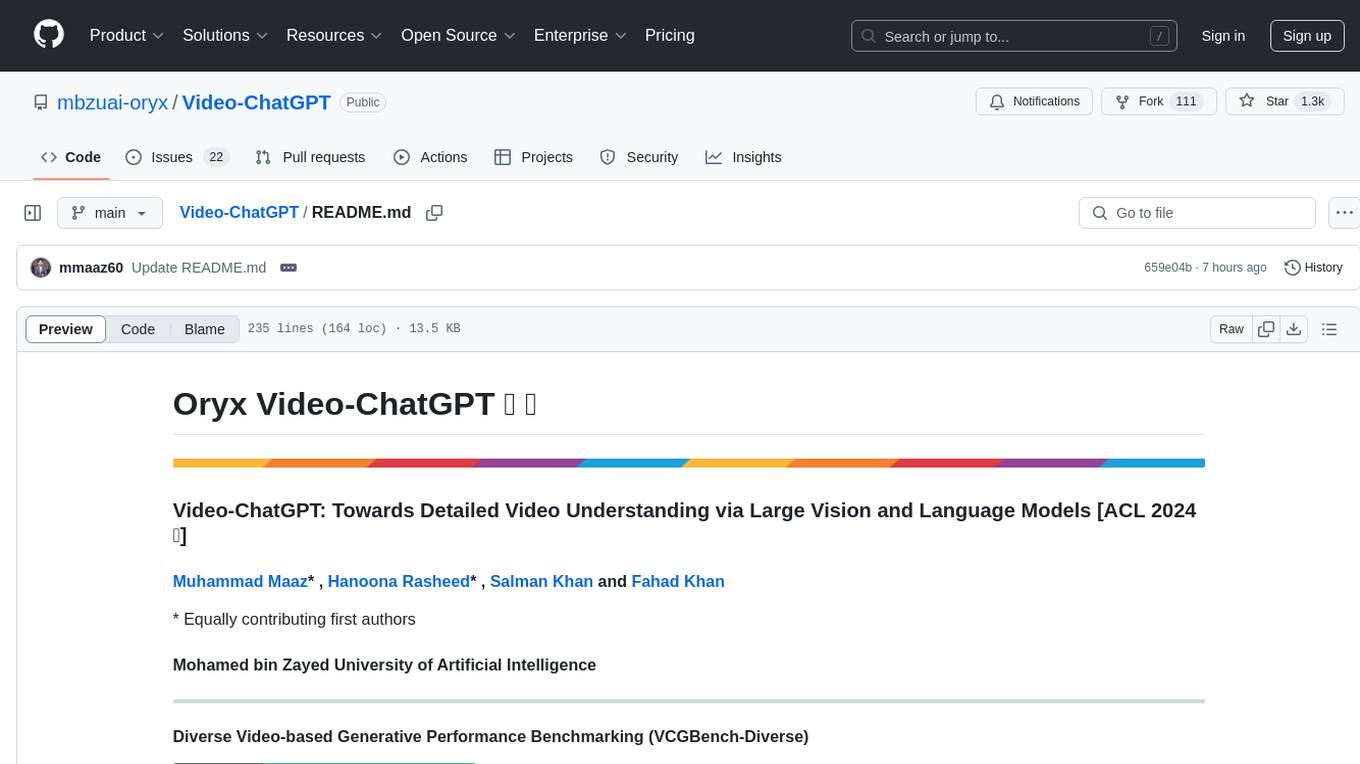
Video-ChatGPT
Video-ChatGPT is a video conversation model that aims to generate meaningful conversations about videos by combining large language models with a pretrained visual encoder adapted for spatiotemporal video representation. It introduces high-quality video-instruction pairs, a quantitative evaluation framework for video conversation models, and a unique multimodal capability for video understanding and language generation. The tool is designed to excel in tasks related to video reasoning, creativity, spatial and temporal understanding, and action recognition.
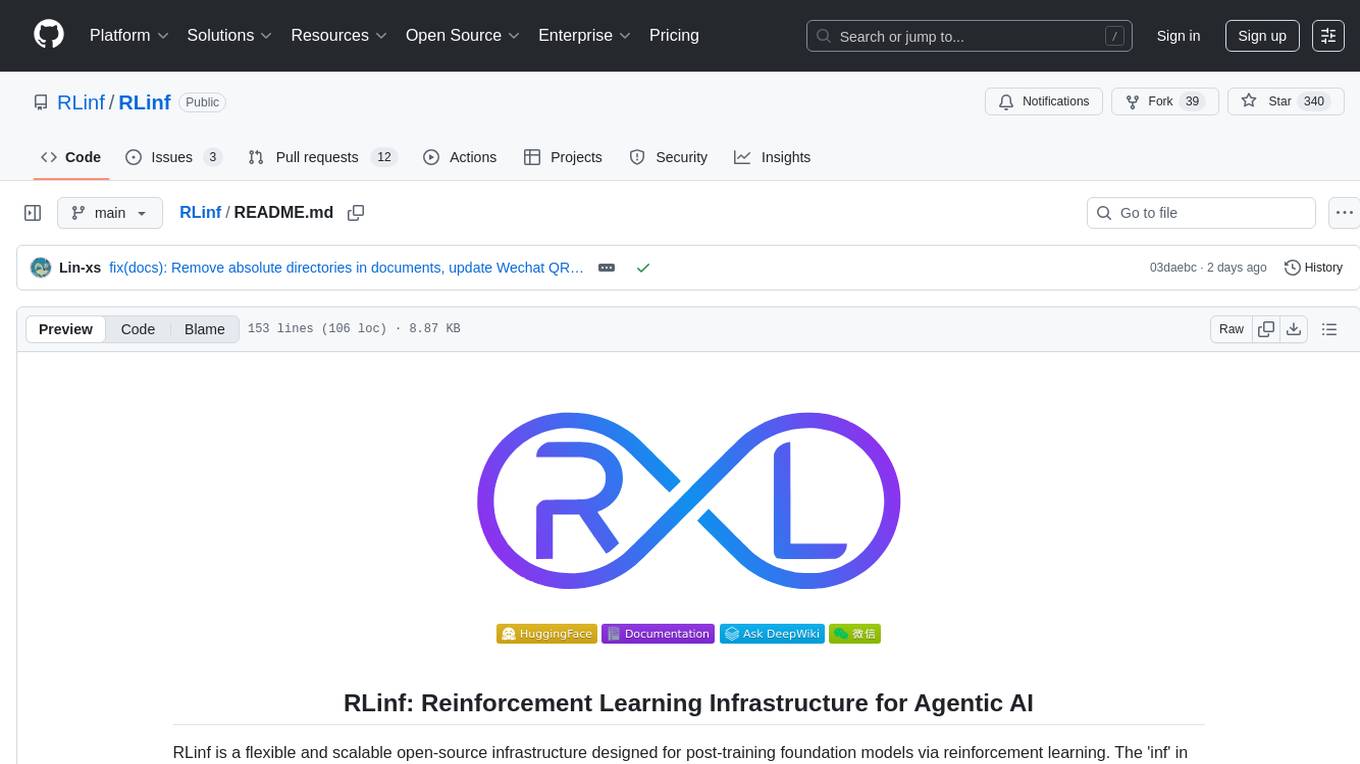
RLinf
RLinf is a flexible and scalable open-source infrastructure designed for post-training foundation models via reinforcement learning. It provides a robust backbone for next-generation training, supporting open-ended learning, continuous generalization, and limitless possibilities in intelligence development. The tool offers unique features like Macro-to-Micro Flow, flexible execution modes, auto-scheduling strategy, embodied agent support, and fast adaptation for mainstream VLA models. RLinf is fast with hybrid mode and automatic online scaling strategy, achieving significant throughput improvement and efficiency. It is also flexible and easy to use with multiple backend integrations, adaptive communication, and built-in support for popular RL methods. The roadmap includes system-level enhancements and application-level extensions to support various training scenarios and models. Users can get started with complete documentation, quickstart guides, key design principles, example gallery, advanced features, and guidelines for extending the framework. Contributions are welcome, and users are encouraged to cite the GitHub repository and acknowledge the broader open-source community.
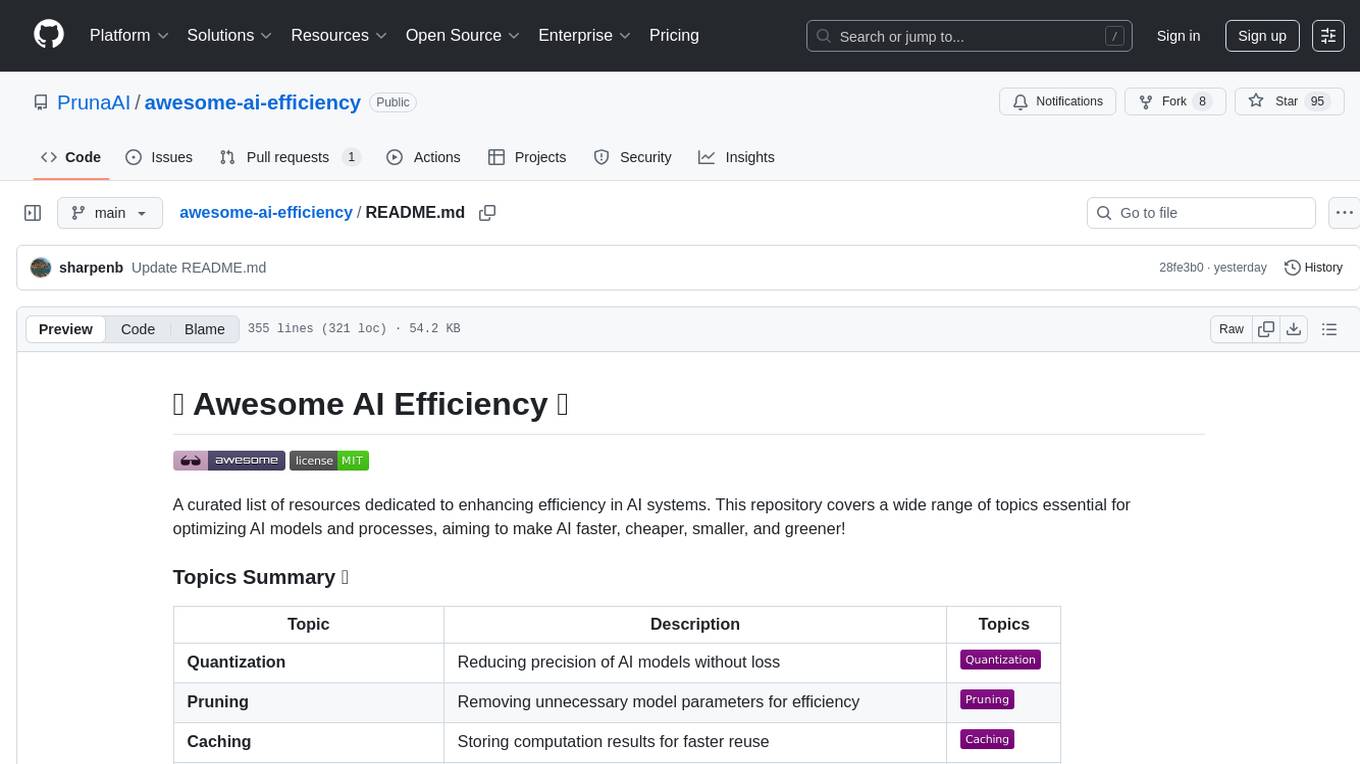
awesome-ai-efficiency
Awesome AI Efficiency is a curated list of resources dedicated to enhancing efficiency in AI systems. The repository covers various topics essential for optimizing AI models and processes, aiming to make AI faster, cheaper, smaller, and greener. It includes topics like quantization, pruning, caching, distillation, factorization, compilation, parameter-efficient fine-tuning, speculative decoding, hardware optimization, training techniques, inference optimization, sustainability strategies, and scalability approaches.
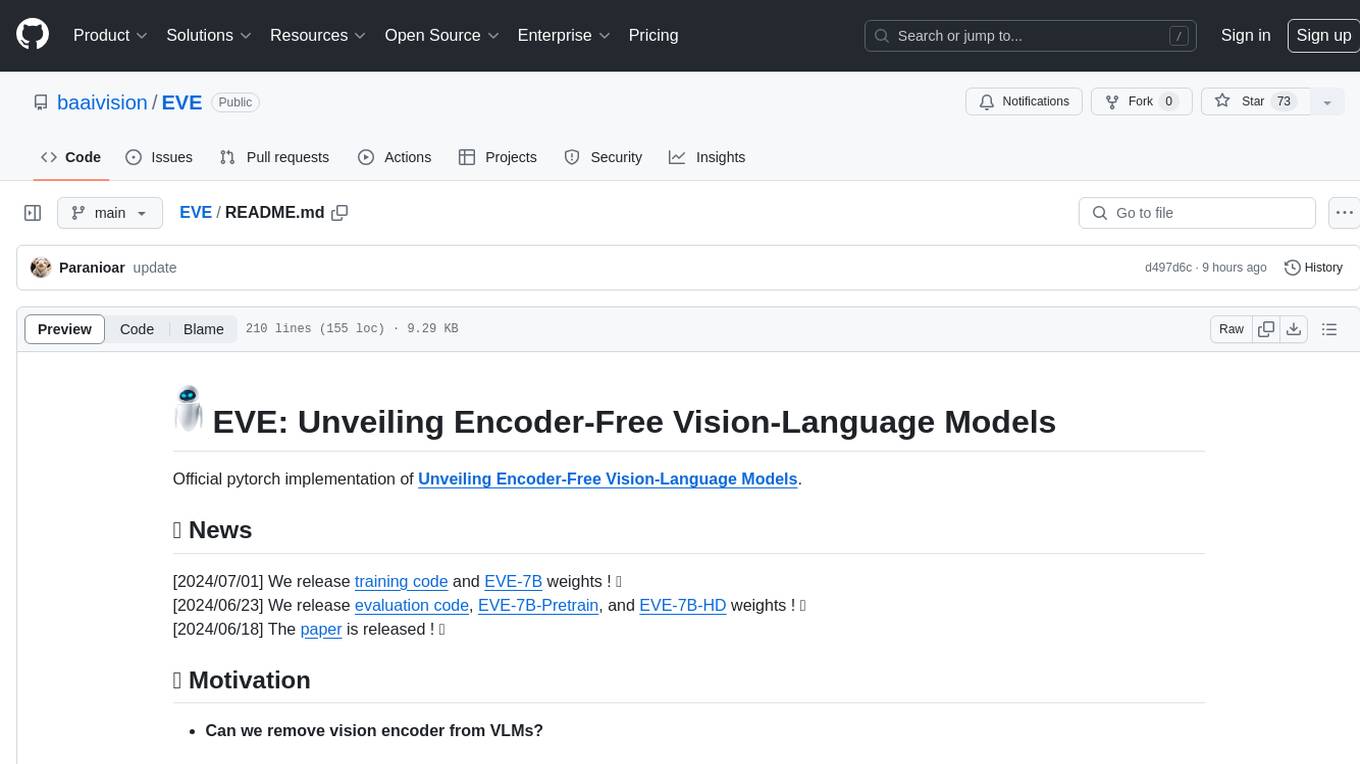
EVE
EVE is an official PyTorch implementation of Unveiling Encoder-Free Vision-Language Models. The project aims to explore the removal of vision encoders from Vision-Language Models (VLMs) and transfer LLMs to encoder-free VLMs efficiently. It also focuses on bridging the performance gap between encoder-free and encoder-based VLMs. EVE offers a superior capability with arbitrary image aspect ratio, data efficiency by utilizing publicly available data for pre-training, and training efficiency with a transparent and practical strategy for developing a pure decoder-only architecture across modalities.
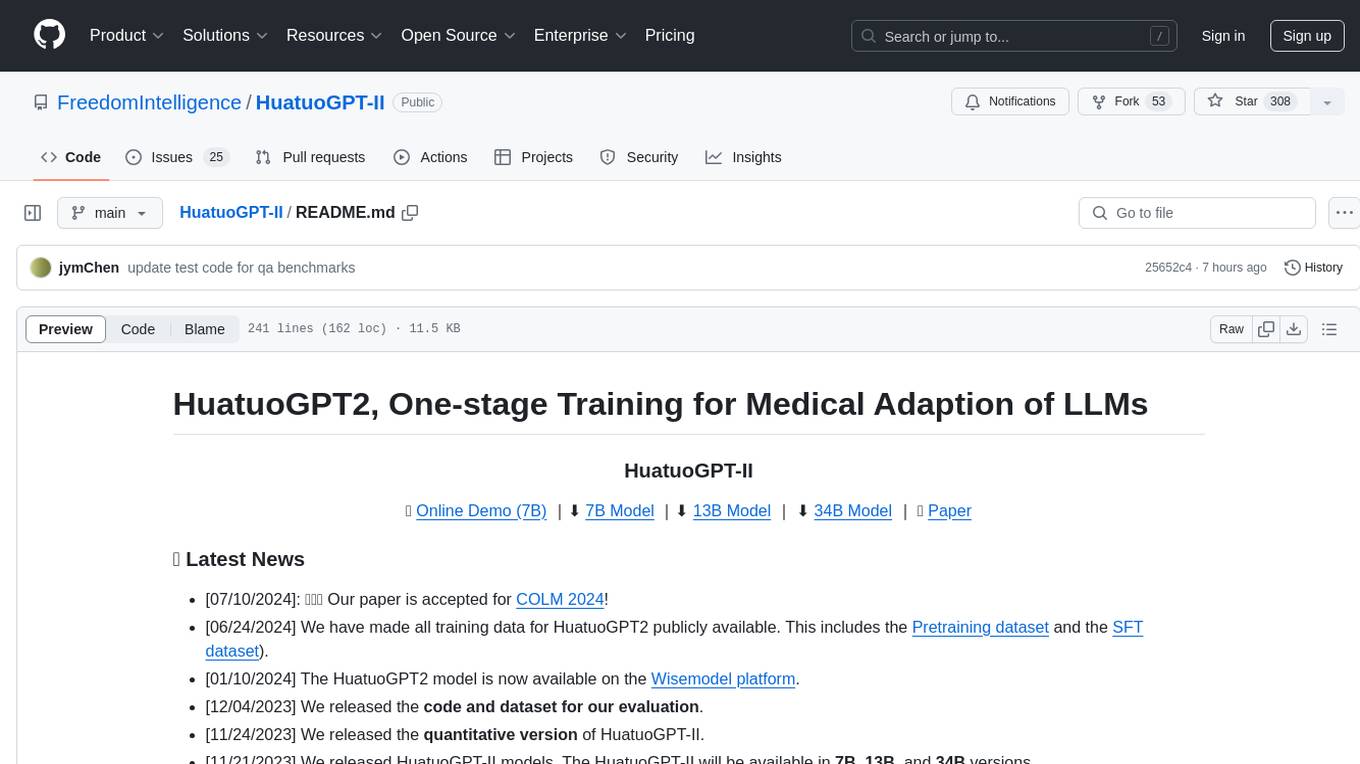
HuatuoGPT-II
HuatuoGPT2 is an innovative domain-adapted medical large language model that excels in medical knowledge and dialogue proficiency. It showcases state-of-the-art performance in various medical benchmarks, surpassing GPT-4 in expert evaluations and fresh medical licensing exams. The open-source release includes HuatuoGPT2 models in 7B, 13B, and 34B versions, training code for one-stage adaptation, partial pre-training and fine-tuning instructions, and evaluation methods for medical response capabilities and professional pharmacist exams. The tool aims to enhance LLM capabilities in the Chinese medical field through open-source principles.
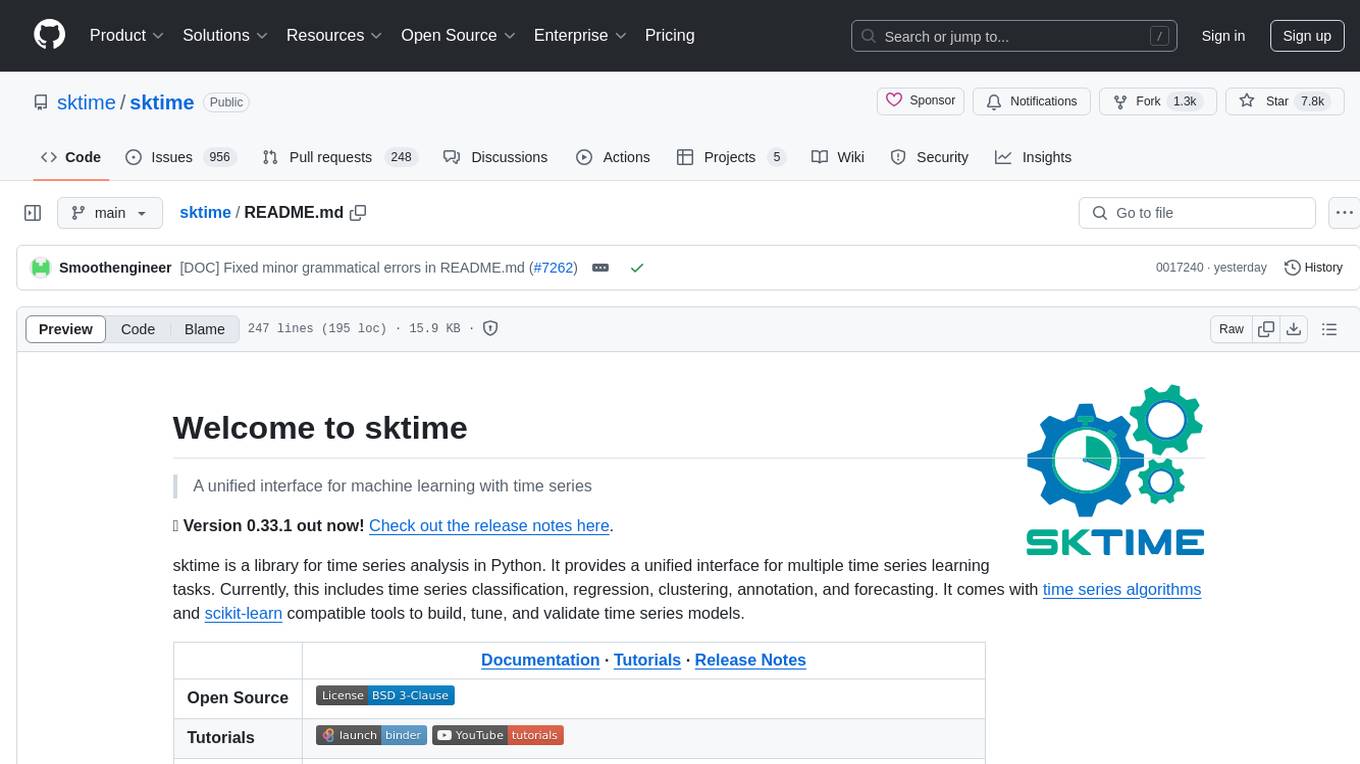
sktime
sktime is a Python library for time series analysis that provides a unified interface for various time series learning tasks such as classification, regression, clustering, annotation, and forecasting. It offers time series algorithms and tools compatible with scikit-learn for building, tuning, and validating time series models. sktime aims to enhance the interoperability and usability of the time series analysis ecosystem by empowering users to apply algorithms across different tasks and providing interfaces to related libraries like scikit-learn, statsmodels, tsfresh, PyOD, and fbprophet.
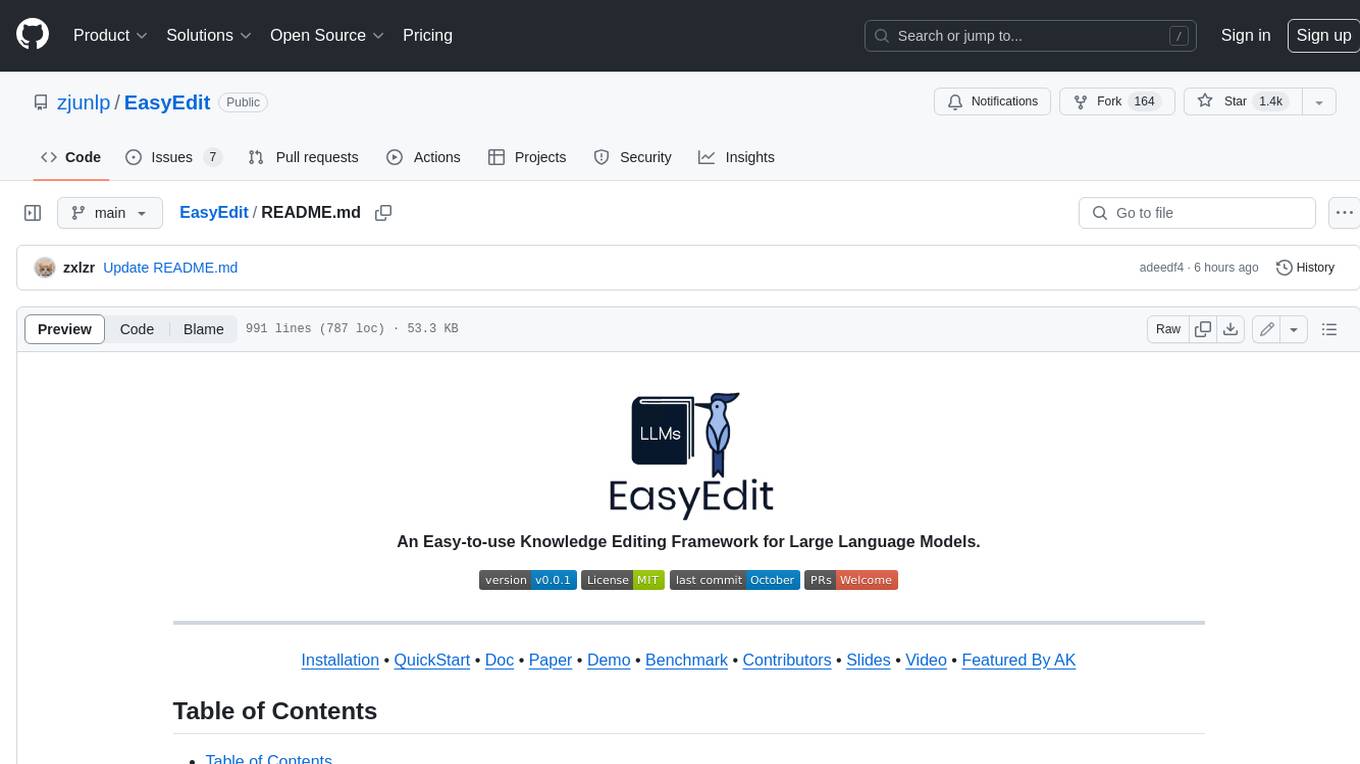
EasyEdit
EasyEdit is a Python package for edit Large Language Models (LLM) like `GPT-J`, `Llama`, `GPT-NEO`, `GPT2`, `T5`(support models from **1B** to **65B**), the objective of which is to alter the behavior of LLMs efficiently within a specific domain without negatively impacting performance across other inputs. It is designed to be easy to use and easy to extend.
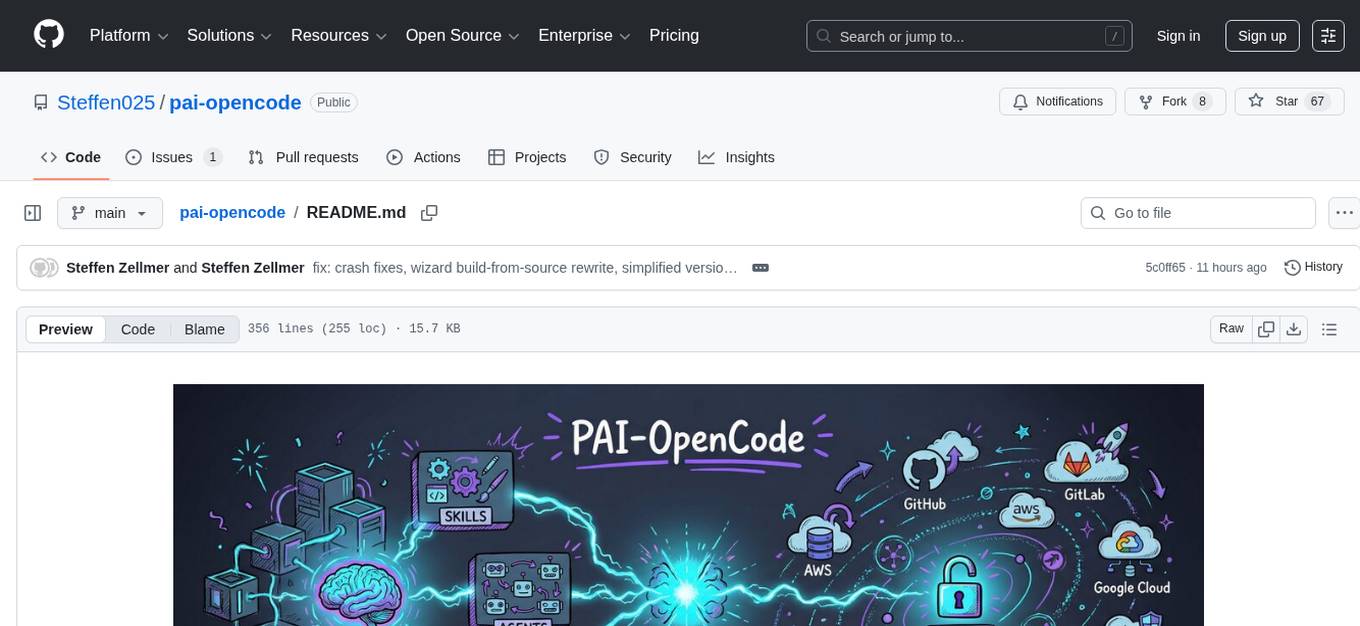
pai-opencode
PAI-OpenCode is a complete port of Daniel Miessler's Personal AI Infrastructure (PAI) to OpenCode, an open-source, provider-agnostic AI coding assistant. It brings modular capabilities, dynamic multi-agent orchestration, session history, and lifecycle automation to personalize AI assistants for users. With support for 75+ AI providers, PAI-OpenCode offers dynamic per-task model routing, full PAI infrastructure, real-time session sharing, and multiple client options. The tool optimizes cost and quality with a 3-tier model strategy and a 3-tier research system, allowing users to switch presets for different routing strategies. PAI-OpenCode's architecture preserves PAI's design while adapting to OpenCode, documented through Architecture Decision Records (ADRs).
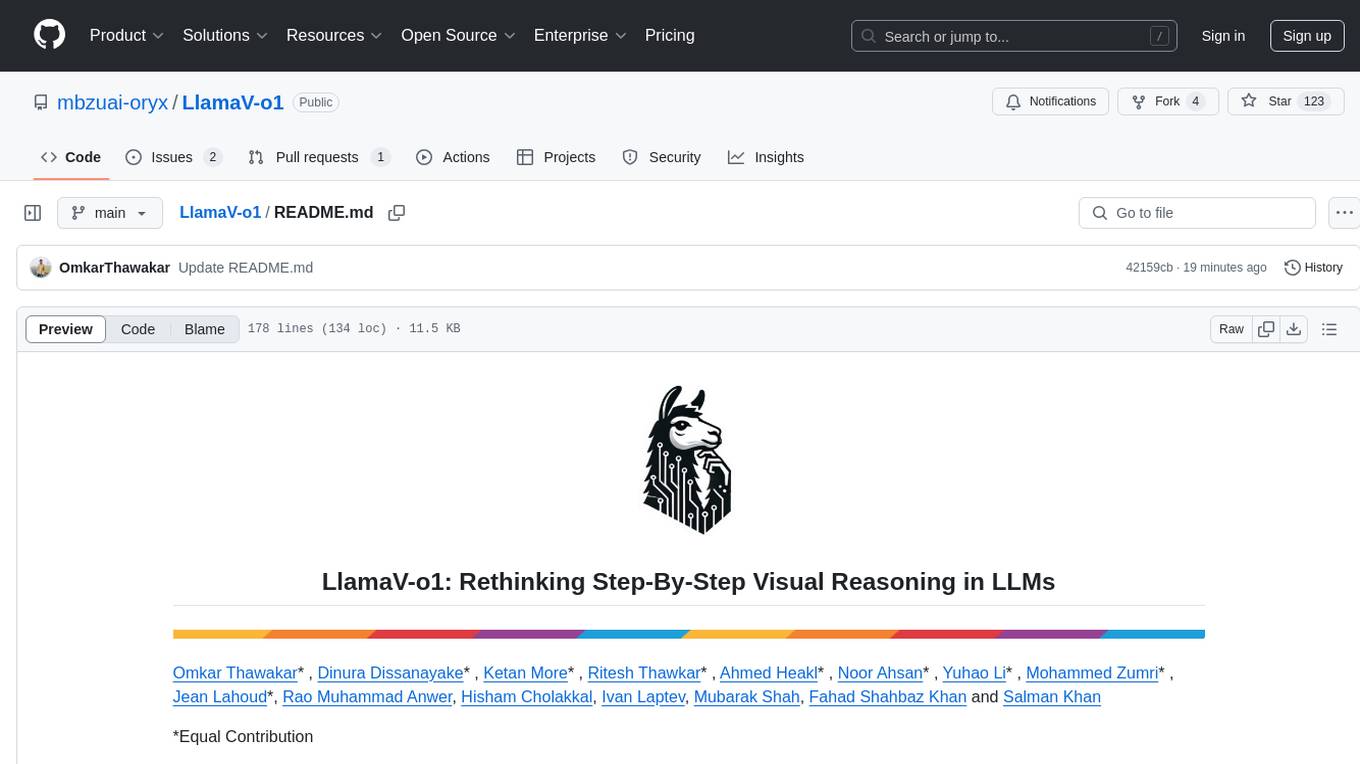
LlamaV-o1
LlamaV-o1 is a Large Multimodal Model designed for spontaneous reasoning tasks. It outperforms various existing models on multimodal reasoning benchmarks. The project includes a Step-by-Step Visual Reasoning Benchmark, a novel evaluation metric, and a combined Multi-Step Curriculum Learning and Beam Search Approach. The model achieves superior performance in complex multi-step visual reasoning tasks in terms of accuracy and efficiency.
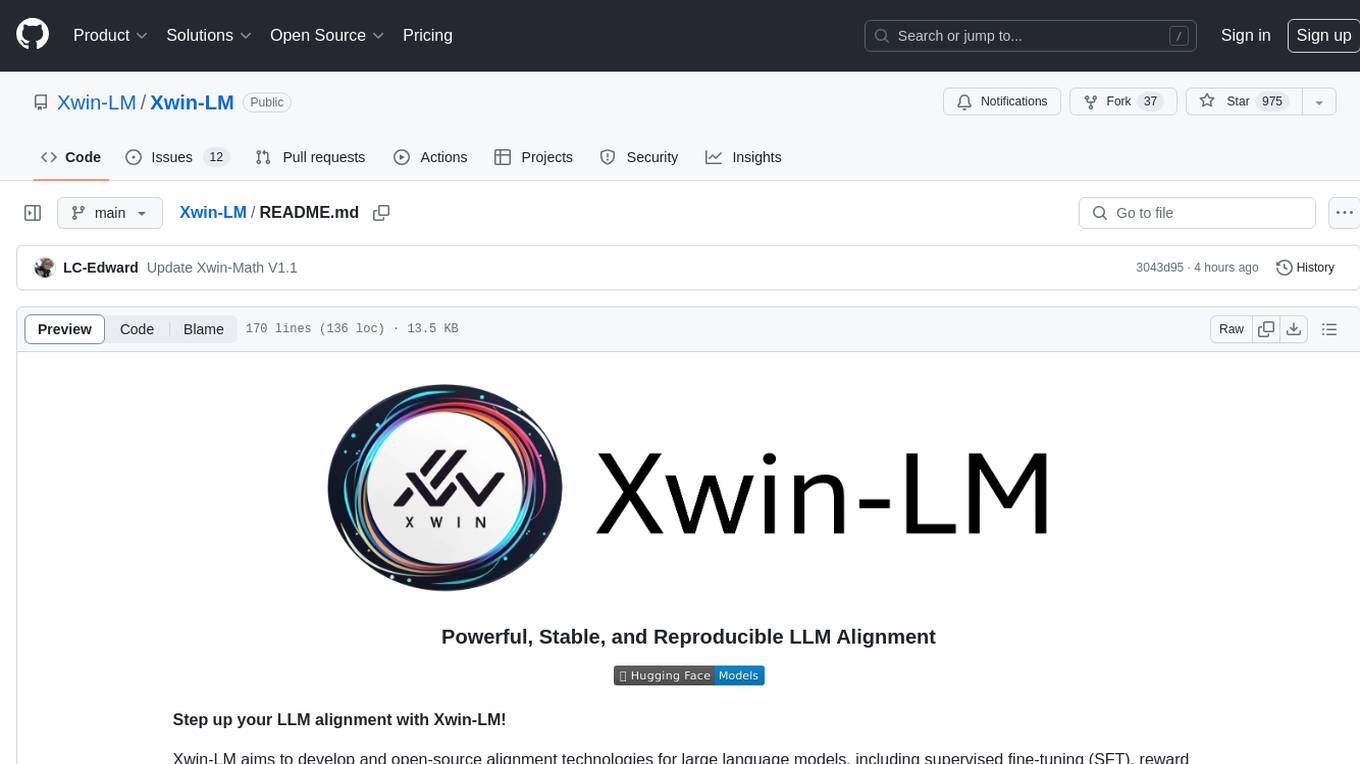
Xwin-LM
Xwin-LM is a powerful and stable open-source tool for aligning large language models, offering various alignment technologies like supervised fine-tuning, reward models, reject sampling, and reinforcement learning from human feedback. It has achieved top rankings in benchmarks like AlpacaEval and surpassed GPT-4. The tool is continuously updated with new models and features.
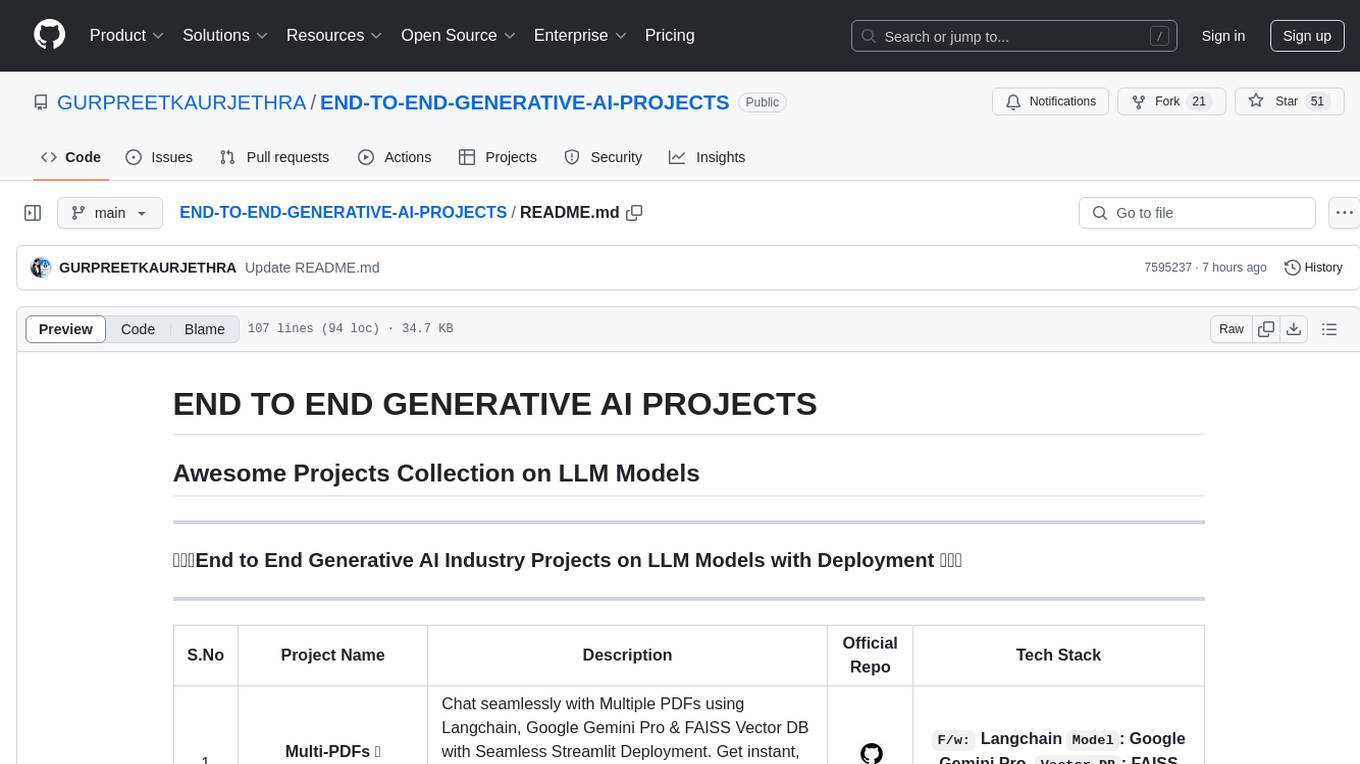
END-TO-END-GENERATIVE-AI-PROJECTS
The 'END TO END GENERATIVE AI PROJECTS' repository is a collection of awesome industry projects utilizing Large Language Models (LLM) for various tasks such as chat applications with PDFs, image to speech generation, video transcribing and summarizing, resume tracking, text to SQL conversion, invoice extraction, medical chatbot, financial stock analysis, and more. The projects showcase the deployment of LLM models like Google Gemini Pro, HuggingFace Models, OpenAI GPT, and technologies such as Langchain, Streamlit, LLaMA2, LLaMAindex, and more. The repository aims to provide end-to-end solutions for different AI applications.
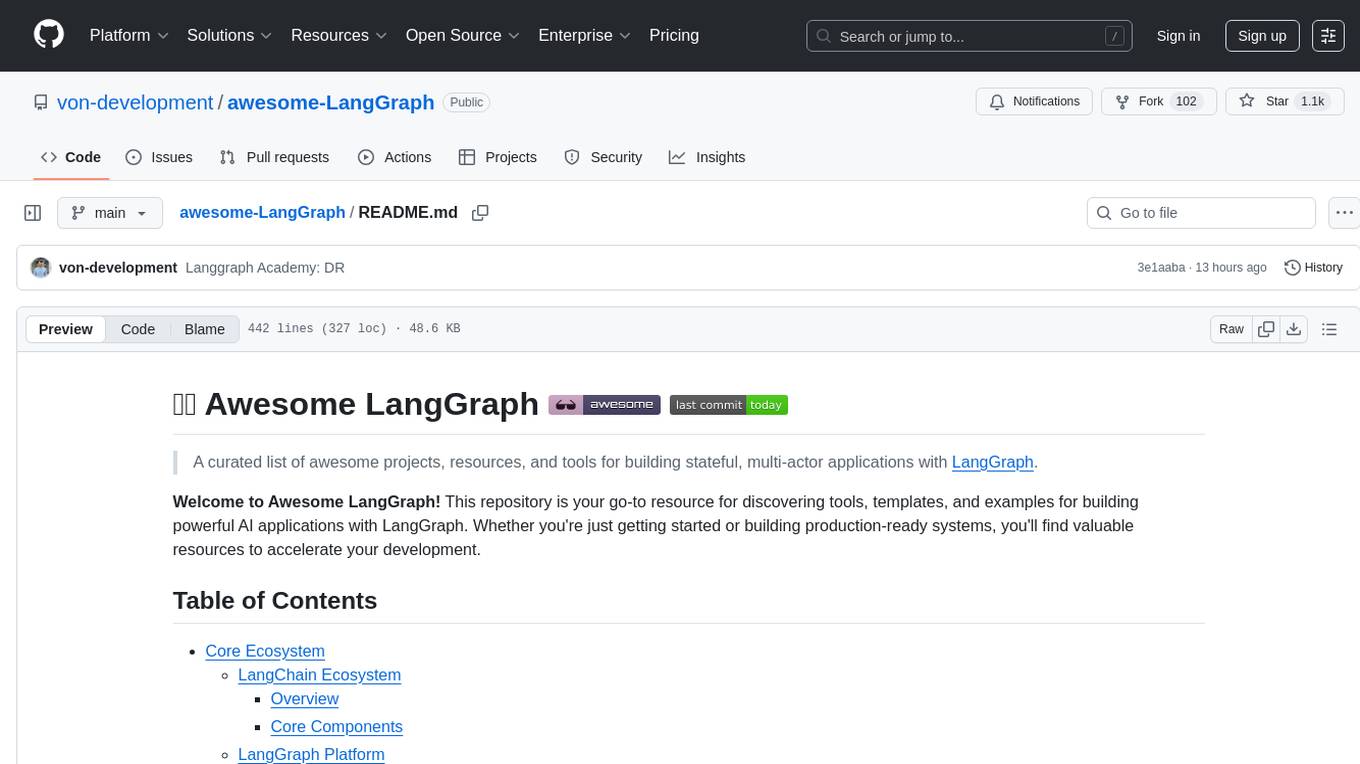
awesome-LangGraph
Awesome LangGraph is a curated list of projects, resources, and tools for building stateful, multi-actor applications with LangGraph. It provides valuable resources for developers at all stages of development, from beginners to those building production-ready systems. The repository covers core ecosystem components, LangChain ecosystem, LangGraph platform, official resources, starter templates, pre-built agents, example applications, development tools, community projects, AI assistants, content & media, knowledge & retrieval, finance & business, sustainability, learning resources, companies using LangGraph, contributing guidelines, and acknowledgments.

































